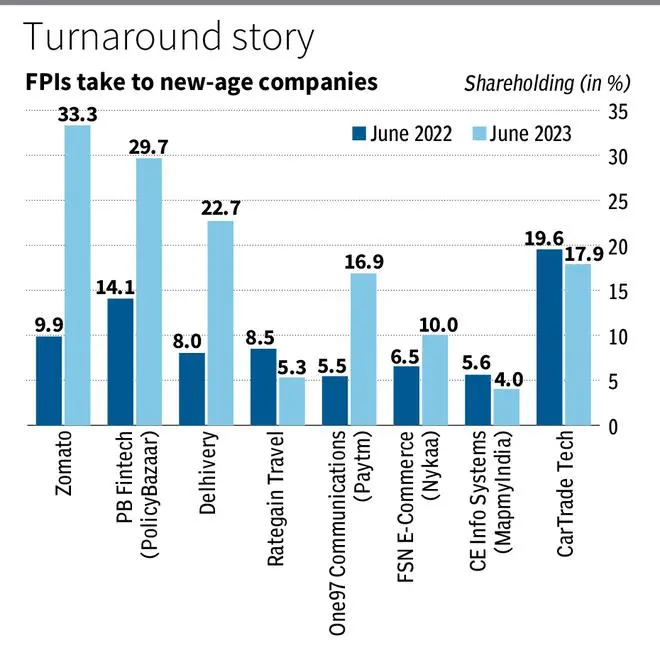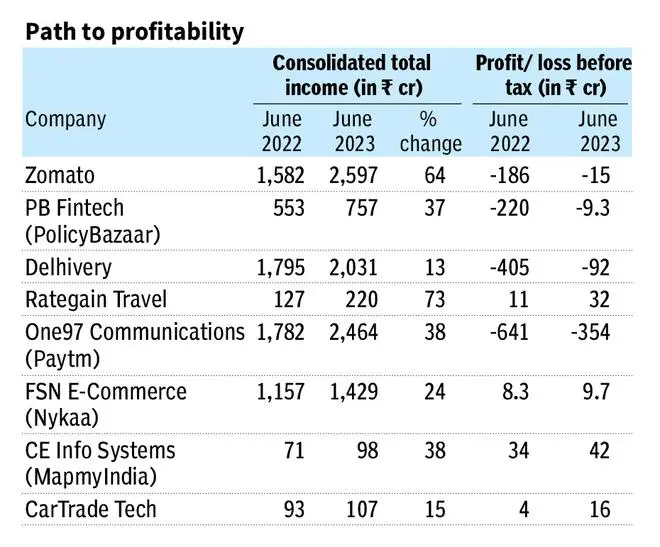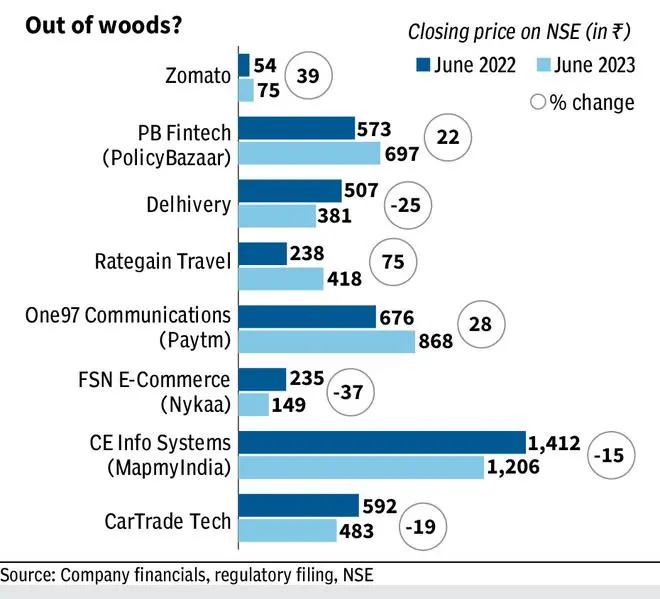What were once dubbed as overvalued and loss-making companies are turning to be the new favourite of foreign investors. From Paytm to Zomato, foreign portfolio investors (FPIs) have raised their stake in many new-age listed companies. Foreign investors appear to have been quick to smell the turnaround in these companies, which have shown material growth in revenue and improvement in profitability. This seems to have been achieved by reducing cash burns, improving operational efficiency and exploring newer revenue models.
According to the latest shareholding data, FPI holding in online food aggregator platform Zomato jumped to 33.33 per cent at the end of Q1FY24 from 9.85 per cent at the end of the same quarter of the previous year. They also raised their stake in PB Fintech, the parent of insurance platform Policybazaar; logistics provider Delhivery; One97 Communications, the parent company of Paytm, in the range of 10-16 per cent during the latest quarter.

Earlier, many of these companies were spending more than required, but now they are cutting costs and still managing to show growth, said Shyam Sekhar, an ace investor and Founder and Chief Ideator, i-thought Advisory Services. “Somewhere there could be a tipping point where growth and profitability could happen. FIIs are betting in anticipation of that point.”
Perhaps, some companies have already reached that tipping point. For instance, Zomato turned profitable for the first time ever in Q1FY24. The firm reported a consolidated net profit of ₹2 crore in the April-June quarter (loss of ₹186 crore). At the EBITDA-level too, its losses narrowed from ₹307 crore in Q1FY23 to ₹48 crore in the recent quarter. PolicyBazaar’s EBITDA loss narrowed from ₹234 crore to ₹77 crore during the comparable quarters.

Valuation concerns
New-age digital companies including Paytm, Zomato, PB Fintech and Nykaa had their public market debut in 2021, when India saw 63 companies raising a record ₹1.2-lakh crore in initial public offering (IPO). However, shortly after listing the hype around many of these stocks fizzled out as concerns over stretched valuations, lack of scalability and growth began to grow.
“Markets have a tendency to over-react, both on the upside and downside,” says VK Vijayakumar, Chief Investment Strategist at Geojit Financial Services. He said when these stocks were listed during the market euphoria of 2021, investors mopped up these stocks by paying exorbitant prices, which was an overreaction on the upside. When the markets corrected, these stocks crashed, in some cases by 75 per cent. This was an overreaction on the downside.
“Now, sanity has returned, and valuations are at reasonable levels. Zomato has turned profitable. Paytm will turn profitable soon. PolicyBazaar is doing well. Mutual funds and HNIs who know market valuations better are increasing their stake in these growth stocks,” he added.
In a recent note, Motilal Oswal said Paytm has seen moderation in payment processing charges, marketing activities, and promotional expenses over the recent years.
“While Paytm will continue to invest in growth and merchant base expansion, the improvement in operating leverage will nevertheless aid profitability,” it added.
FPIs’ optimism has also been reflected in some of the stock prices. For instance, shares of Rategain Travel have rallied over 75 per cent in the last one year, while Zomato, PolicyBazaar and Paytm saw a 20-40 per cent increase. To be sure, many of these stocks are still trading way below their listing price. Paytm was listed at ₹2,150, but it is currently trading only at ₹858, while Zomato which listed at ₹116 is ruling at ₹92.

Sekhar said from an investor perspective, the valuations of these companies are still not attractive. “But FIIs are interested in the India growth story and they find these companies are ideal for such a large-sized opportunity with huge headroom for growth in next 3-5 years.”








Comments
Comments have to be in English, and in full sentences. They cannot be abusive or personal. Please abide by our community guidelines for posting your comments.
We have migrated to a new commenting platform. If you are already a registered user of TheHindu Businessline and logged in, you may continue to engage with our articles. If you do not have an account please register and login to post comments. Users can access their older comments by logging into their accounts on Vuukle.